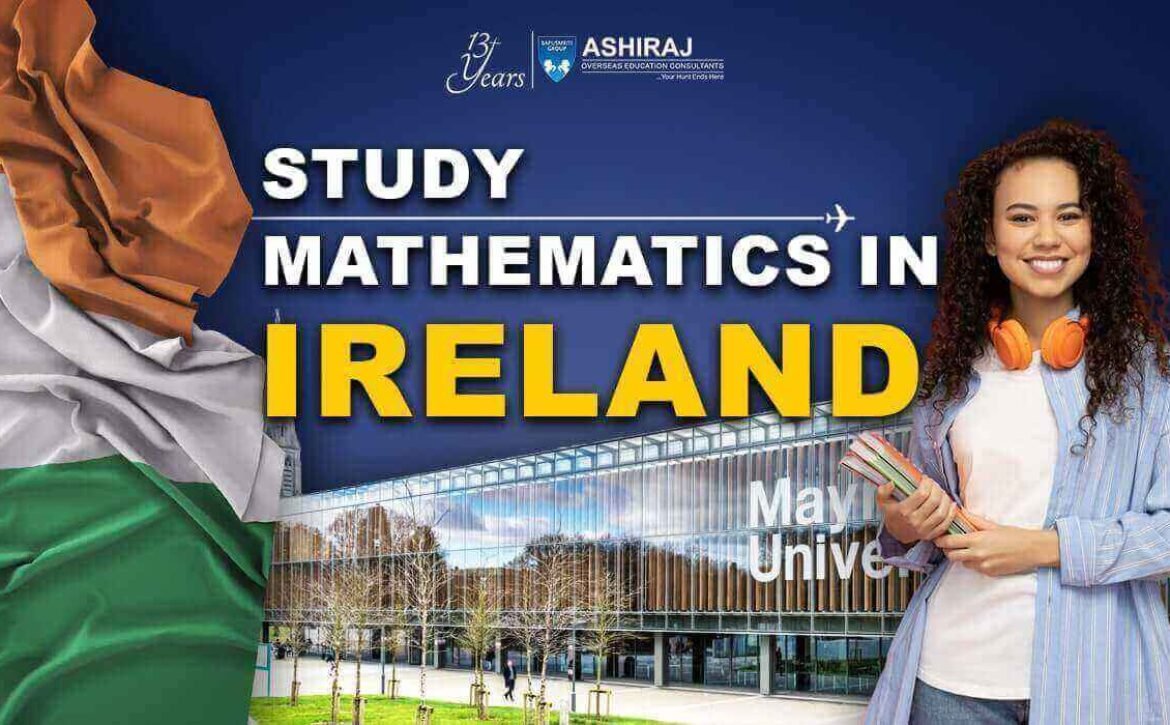
Mathematics in Ireland
Mathematics in Ireland holds a significant position in the country’s educational and cultural landscape. As a nation renowned for its rich history in literature, science, and arts, Ireland has also made substantial contributions to the field of mathematics. From ancient Celtic scholars to modern-day mathematicians, Ireland’s mathematical heritage is both diverse and influential. Throughout its history, Ireland has produced notable mathematicians such as George Boole, whose work laid the foundation for modern computer science with Boolean algebra. Additionally, Ireland boasts a strong academic tradition in mathematics, with institutions like Trinity College Dublin and University College Cork offering world-class programs and research opportunities in various mathematical disciplines.
The study and application of mathematics in Ireland extend beyond academia, permeating industries such as technology, finance, and engineering. The country’s emphasis on mathematics education underscores its commitment to fostering analytical thinking and problem-solving skills among its citizens. Furthermore, initiatives like the Irish Mathematical Olympiad nurture young talent and cultivate a vibrant mathematical community. As Ireland continues to embrace innovation and technology, mathematics remains a cornerstone of its intellectual and economic prosperity, shaping its future in an increasingly interconnected world.
Why to Study Mathematics in Ireland?
- Rich Mathematical Heritage: Ireland has a long history of producing influential mathematicians, such as George Boole, whose work laid the groundwork for modern computer science.
- World-Class Institutions: Ireland is home to renowned universities like Trinity College Dublin and University College Cork, offering top-notch mathematics programs with access to cutting-edge research facilities.
- Diverse Academic Offerings: Whether you’re interested in pure mathematics, applied mathematics, or interdisciplinary studies, Ireland provides a wide range of academic programs to suit your interests and career goals.
- Strong Emphasis on Education: Ireland highly values education, with a curriculum that prioritizes mathematical literacy and critical thinking skills, preparing students for success in various fields.
- Thriving Mathematical Community: With initiatives like the Irish Mathematical Olympiad and numerous mathematics societies and clubs, Ireland offers a vibrant community for mathematicians to engage, collaborate, and grow.
- Career Opportunities: A degree in mathematics from Ireland opens doors to diverse career paths in industries such as technology, finance, engineering, and research, both within Ireland and internationally.
- Quality of Life: Beyond academic pursuits, Ireland offers a high quality of life, with its stunning landscapes, rich culture, and welcoming community, making it an attractive destination for studying mathematics.
In conclusion, studying mathematics in Ireland provides an enriching educational experience, access to world-class institutions, and ample opportunities for personal and professional growth.
Top Universities to Study Mathematics in Ireland
University | QS World University Rankings 2023 | Type of University | Average Annual Fees (EUR) | Programs Offered |
Trinity College Dublin | 85 | Public | €6,000 – €9,000 | Mathematics, Applied Mathematics, Statistics |
University College Cork | 160 | Public | €6,000 – €8,000 | Mathematics, Financial Mathematics, Mathematical Sciences |
National University of Ireland, Galway | 201-250 | Public | €5,000 – €7,000 | Mathematics, Computational Mathematics, Data Science |
University College Dublin | 203 | Public | €6,000 – €10,000 | Mathematics, Actuarial Science, Mathematical Sciences |
Dublin City University | 251-300 | Public | €5,000 – €8,000 | Mathematics, Applied Mathematics, Financial Mathematics |
The pursuit of mathematics in Ireland is enriched by its top-ranking universities, offering diverse programs and opportunities for academic growth. Trinity College Dublin, ranked 85th in the QS World University Rankings 2023, stands out for its comprehensive mathematics programs covering pure and applied mathematics along with statistics. University College Cork, ranked 160th, provides specialized tracks including financial mathematics within its mathematics curriculum. The National University of Ireland, Galway, positioned between 201-250, offers a range of mathematics programs with a focus on computational mathematics and data science. University College Dublin, ranked 203rd, emphasizes interdisciplinary studies in mathematics, including actuarial science. Lastly, Dublin City University, placed between 251-300, offers mathematics programs tailored to various fields such as finance and applied mathematics. These universities not only provide quality education but also contribute significantly to the advancement of mathematics in Ireland.
Course Curriculum for Mathematics in Ireland
- Foundational Concepts: Mathematics courses in Ireland typically begin with foundational concepts such as algebra, calculus, and geometry to provide students with a solid understanding of fundamental principles.
- Advanced Topics: As students progress, they delve into advanced topics like differential equations, linear algebra, and mathematical modeling, equipping them with the skills needed for higher-level analysis and problem-solving.
- Specialized Tracks: Universities in Ireland offer specialized tracks within mathematics, including applied mathematics, statistics, and financial mathematics, allowing students to tailor their studies to their interests and career aspirations.
- Interdisciplinary Integration: Many mathematics programs in Ireland integrate interdisciplinary elements, enabling students to apply mathematical concepts to fields such as computer science, engineering, and economics, fostering a holistic approach to problem-solving.
- Research Opportunities: Students often have the opportunity to engage in research projects, either independently or as part of a team, under the guidance of faculty members, contributing to advancements in mathematical theory and application.
- Practical Applications: Mathematics courses in Ireland emphasize practical applications, preparing students for real-world challenges in industries such as technology, finance, and engineering, ensuring they graduate with relevant skills and knowledge.
Eligibility Criteria & Admission Requirements for MS in Mathematics in Ireland
- Language Proficiency: Applicants must demonstrate proficiency in English by submitting either IELTS or TOEFL scores. For IELTS, a minimum score of 6.5 overall is typically required, with no individual band score below 6.0. Alternatively, a TOEFL score of 90 or above is commonly accepted.
- Standardized Tests: Prospective students may need to provide GRE or GMAT scores, depending on the specific requirements of the university or program. For GRE, a competitive score in the quantitative section, typically above 160, is advisable. Similarly, a GMAT score above 600 is often preferred.
Exam | Minimum Score |
IELTS | 6.5 Overall, no band below 6.0 |
TOEFL | 90 or above (iBT) |
GRE | Above 160 (Quantitative) |
GMAT | Above 600 |
- Educational Credentials: Applicants should possess a bachelor’s degree or its equivalent in a relevant field, with a strong academic record in mathematics or related subjects.
- Passport & Student Visa: International students must have a valid passport and obtain a student visa to study in Ireland. The visa application process typically requires proof of acceptance into a recognized educational institution and sufficient financial resources to cover tuition fees and living expenses.
- Academic Certificates: Applicants are required to submit official transcripts and academic certificates from previous educational institutions as part of the application process.
- Work Experience: While not always mandatory, some mathematics programs may prefer applicants with relevant work experience, especially for advanced or specialized courses.
Meeting these eligibility criteria ensures that prospective students are well-prepared to embark on their academic journey in mathematics in Ireland, contributing to the vibrant academic community and advancing their careers in the field.
Documents Required for Studying Mathematics in Ireland
- Passport: A valid passport is essential for international students applying to study mathematics in Ireland. It serves as proof of identity and nationality.
- Letters of Recommendation (LOR): Applicants are typically required to submit two or more LORs from academic or professional referees who can attest to their abilities, character, and suitability for the mathematics program.
- Statement of Purpose (SOP): An SOP outlines the applicant’s academic and career goals, reasons for choosing the mathematics program, and how they plan to contribute to the field.
- Curriculum Vitae (CV): A CV provides a comprehensive overview of the applicant’s educational background, work experience, skills, and achievements relevant to the mathematics program.
- Official High School Transcripts and Educational Certificates: Applicants must submit official transcripts and certificates from their high school or secondary education institution to demonstrate their academic qualifications.
- Work Experience Certificate: If applicable, applicants should provide a work experience certificate detailing their relevant professional experience in mathematics or related fields.
- Proof of Financial Resources: International students must demonstrate sufficient financial resources to cover tuition fees, living expenses, and other related costs for the duration of their mathematics program in Ireland.
Gathering these documents ensures that applicants have fulfilled the requirements for admission to mathematics programs in Ireland, facilitating a smooth application process and increasing their chances of acceptance.
Admission Process for Mathematics in Ireland
- Research and Choose Universities: Research various universities in Ireland offering mathematics programs and choose the ones that best align with your academic and career goals.
- Check Eligibility Criteria: Review the eligibility criteria for each university, including academic requirements, language proficiency exams (such as IELTS or TOEFL), and standardized test scores (GRE or GMAT).
- Gather Required Documents: Collect all necessary documents, including passport, letters of recommendation, statement of purpose, curriculum vitae, official transcripts, educational certificates, work experience certificate (if applicable), and proof of financial resources.
- Submit Online Application: Complete the online application form for your chosen universities, ensuring all required information and documents are accurately filled out and attached.
- Pay Application Fee: Pay the application fee as per the university’s instructions to finalize your application submission.
- Monitor Application Status: Keep track of your application status through the university’s online portal or communication channels. Follow up with any additional requirements or requests from the admissions office.
- Wait for Admission Decision: Await the admission decision from the university. This process may take several weeks to months, depending on the university’s review process and timeline.
- Accept Offer and Fulfill Conditions: Upon receiving an offer of admission, accept it within the specified deadline and fulfill any conditions outlined, such as submitting final transcripts or additional documentation.
- Apply for Student Visa: Once you’ve accepted the offer, begin the process of applying for a student visa to study mathematics in Ireland. Follow the visa application instructions provided by the Irish embassy or consulate in your home country.
- Prepare for Arrival: Make necessary arrangements for accommodation, travel, and other logistics to ensure a smooth transition to studying mathematics in Ireland.
Following these steps will guide you through the admission process for mathematics programs in Ireland, setting you on the path towards a rewarding academic journey in the field.
“Education is the most powerful weapon which you can use to change the world.”
Nelson Mandela
Cost of Mathematics Course in Ireland
- Tuition Fees: The cost of tuition for mathematics programs in Ireland varies depending on the university and level of study. On average, undergraduate tuition fees for international students range from €10,000 to €20,000 per year, while postgraduate fees can range from €12,000 to €25,000 per year.
- Living Expenses: In addition to tuition fees, students must budget for living expenses such as accommodation, food, transportation, and personal expenses. On average, living costs in Ireland amount to approximately €10,000 to €12,000 per year.
- Additional Costs: There may be additional expenses such as textbooks, course materials, health insurance, and visa fees. These costs can vary depending on individual circumstances and university requirements.
- Scholarships and Financial Aid: Students pursuing mathematics in Ireland may be eligible for scholarships, grants, or financial aid programs offered by the university, government, or private organizations. These can help offset tuition and living expenses.
- Part-Time Work Opportunities: Some students work part-time to supplement their income while studying in Ireland. However, it’s essential to balance work commitments with academic responsibilities.
Understanding the cost of studying mathematics in Ireland is crucial for prospective students to make informed decisions and plan their finances accordingly, ensuring a smooth and successful academic journey.
Scholarships for Mathematics Courses in Ireland
Scholarship Name | Amount | Application Deadline |
Government of Ireland International Education Scholarships | Up to €10,000 tuition waiver | Varies by university, typically between January and March |
Trinity College Dublin Academic Excellence Scholarship | Up to €5,000 per year | March 31st |
University College Cork Excellence Scholarships | Up to €3,000 | May 1st |
National University of Ireland, Galway International Scholarships | Up to €4,000 | April 15th |
University College Dublin Global Excellence Graduate Scholarships | Up to 100% tuition fee waiver | Varies by program, usually between January and April |
Scholarships play a crucial role in supporting students pursuing mathematics in Ireland by providing financial assistance to offset tuition fees and living expenses. The Government of Ireland International Education Scholarships offer significant tuition waivers, with application deadlines varying by university, typically falling between January and March. Trinity College Dublin and University College Cork provide academic excellence scholarships, offering financial support of up to €5,000 and €3,000 respectively, with application deadlines in March and May. Similarly, the National University of Ireland, Galway, offers international scholarships worth up to €4,000, with an application deadline of April 15th. University College Dublin’s Global Excellence Graduate Scholarships provide up to 100% tuition fee waivers, with application deadlines varying by program, usually between January and April. These scholarships provide valuable opportunities for students to pursue their academic goals in mathematics in Ireland.
Career Opportunities After Mathematics in Ireland
Job Profile | Average Salary (EUR) |
Data Analyst | €30,000 – €50,000 |
Actuary | €50,000 – €70,000 |
Financial Analyst | €40,000 – €60,000 |
Statistician | €35,000 – €55,000 |
Software Developer | €35,000 – €60,000 |
Mathematics in Ireland opens up many career opportunities across various industries, with competitive average salaries. Data Analysts utilize mathematical skills to analyze large datasets and derive meaningful insights, earning an average salary ranging from €30,000 to €50,000. Actuaries, who assess financial risks using mathematical models, earn between €50,000 to €70,000 on average. Financial Analysts, applying mathematical techniques to assess financial performance, earn salaries ranging from €40,000 to €60,000. Statisticians, who analyze data to make predictions and decisions, earn an average salary of €35,000 to €55,000. Software Developers, utilizing mathematical algorithms to develop software solutions, earn between €35,000 to €60,000 on average. These career paths highlight the diverse opportunities available for mathematics graduates in Ireland, showcasing the versatility and value of mathematical skills in today’s job market.
Frequently Asked Questions About Mathematics in Ireland
Some universities in Ireland offering mathematics programs include Trinity College Dublin, University College Cork, National University of Ireland, Galway, University College Dublin, and Dublin City University.
Eligibility criteria typically include meeting academic requirements, demonstrating proficiency in English through exams like IELTS or TOEFL, and submitting standardized test scores such as GRE or GMAT.
Yes, there are scholarships available for mathematics students in Ireland, offered by universities, government agencies, and private organizations. These scholarships provide financial assistance to students pursuing mathematics programs.
Mathematics graduates in Ireland can pursue various career paths such as data analysis, actuarial science, financial analysis, statistics, software development, and more, across industries like technology, finance, and research.
The cost of studying mathematics in Ireland includes tuition fees, living expenses, and additional costs such as textbooks and materials. On average, international students can expect to pay between €10,000 to €20,000 per year for tuition.
The application process typically involves researching universities, checking eligibility criteria, gathering required documents, submitting online applications, paying application fees, monitoring application status, and awaiting admission decisions.
While work experience is not always mandatory, having relevant work experience can enhance an applicant’s profile and increase their chances of admission, especially for advanced or specialized mathematics programs.
The duration of mathematics degrees in Ireland varies depending on the level of study and the specific program. Typically, undergraduate programs take three to four years to complete, while postgraduate programs can range from one to two years.
Yes, international students in Ireland are allowed to work part-time during term time and full-time during scheduled breaks. Part-time work can help students gain valuable experience and supplement their income while studying.
Universities in Ireland offer various support services for mathematics students, including academic advising, career counseling, tutoring, mentoring programs, and access to resources such as libraries and study spaces.




